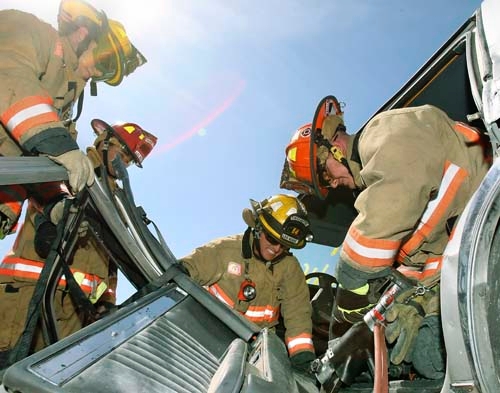Clark County pays millions for unused firefighter skills
Clark County is paying millions of dollars in extra wages -- known as premium pay -- to firefighters certified as medical technicians and paramedics, including to those who don't perform medical work.
County officials say there's a surplus of firefighters receiving an additional 5 percent to 12 percent in premium pay for medical certificates, and that they tack on an unnecessary $2.4 million to labor costs.
These costs stem partly from premium pay being counted toward firefighters' pensions.
Last year, the county spent a total of $5.6 million on premium pay for all its employees. About $4 million of it went to firefighters for medical certifications. Premium pay is one of the issues that have come up as the county and the local firefighters union prepare to enter arbitration.
Union leaders declared an impasse in labor talks in August after bargaining five months with the county for a one-year contract renewal.
County data shows that 362 of the Fire Department's employees are certified as intermediate EMTs and 212 are paramedics.
That well exceeds the 222 EMTs and 150 paramedics needed to cover minimum staffing requirements year round at the county's fire stations and comply with Southern Nevada Health District guidelines.
County Commissioner Steve Sisolak, a staunch critic of firefighters' compensation, said the numbers indicate the county is paying extra for medical staffing it doesn't need.
"It's just another way to bump up their pay," Sisolak said.
Those who never do medical work should not be entitled to a permanent increase in their wages and retirement pay just because they took some training, Sisolak said.
A union leader, however, said in an e-mail that EMTs and paramedics must remain committed to receive their premium pay.
"The Health District requires you to have continued education to keep the certification," said Ryan Beaman, president of the International Association of Firefighters Local 1908.
The county pays for EMT and paramedic training. Firefighters can take re-certification training at their stations while on duty.
Paramedics get 12 percent higher pay. They must pass a three-semester class and take 60 hours of course work every two years to keep the certification.
Intermediate EMTs receive a 7 percent bump. They must pass a two-semester course and take 36 hours every two years. Basic EMTs get a 5 percent raise for attending a one-semester class and taking 24 hours of training every two years.
The labor contract only allows firefighters hired before 1991 to be basic EMTs. All newer firefighters, including those graduating from the academy, are trained at the intermediate level.
Sixty-three firefighters are basic EMTS, costing the county $250,000 in premium pay last year.
Few, if any, do medical work because those tasks are assigned to the paramedics and experienced EMTs on their teams, according to a county source who asked not to be named.
Four fire investigators, three supervisors and two coordinators are certified as paramedics and receive the bonus pay even though they administer no medical care.
Commissioner Tom Collins, a strong union advocate, said premium pay should be trimmed, along with longevity and travel pay.
For example, a paramedic should receive 5 percent or 6 percent in premium pay, and not 12 percent, Collins said.
But Collins said he wasn't sure whether it was wise to reduce the number of available medical personnel, arguing that too many are better than too few when saving lives.
Fire investigators shouldn't be certified and paid as paramedics, he said. But if firefighters ride out to accident scenes, they should be paid extra to be EMTs, he said.
"There needs to be a balance," Collins said.
However, Sisolak argued that firefighters should receive no extra pay for medical certification, given that more than 70 percent of their emergency calls are medical.
"That's part of their job," Sisolak said. "It's what the job entails."
John Wilson, spokesman for AMR and MedicWest Ambulance, said the EMTs and paramedics in his company get no permanent bump in wages.
"Our folks do not get premium pay just for holding a certificate," Wilson said. "We pay our folks for what they do and when they do it."
If a payroll clerk is a certified paramedic, that person would only get paramedic's pay when out in the field doing the work, Wilson said. It's not difficult to pay an employee for the job done in a particular shift, he added.
The company couldn't afford to dish out premium pay and other perks that firefighters receive, he said, adding that revenue has dropped because a growing number of patients aren't paying their ambulance bills.
"We have no tax subsidy," Wilson said.
Sisolak said being paid for the job done seemed reasonable. Premium pay is yet another perk added to the firefighters' contract when the county was flush with cash, he said.
"The sweet contract days are over," Sisolak said.
Contact reporter Scott Wyland at swyland@review journal.com or 702-455-4519.

















